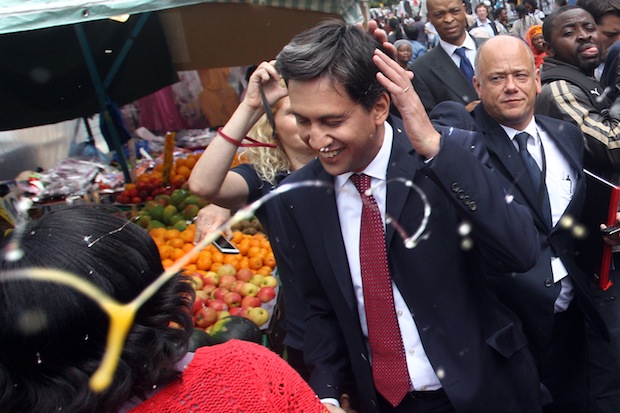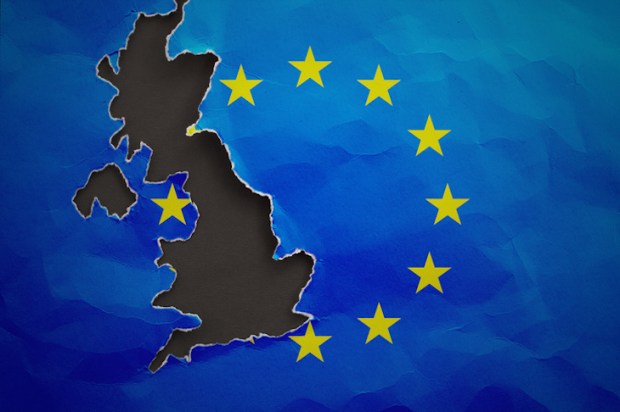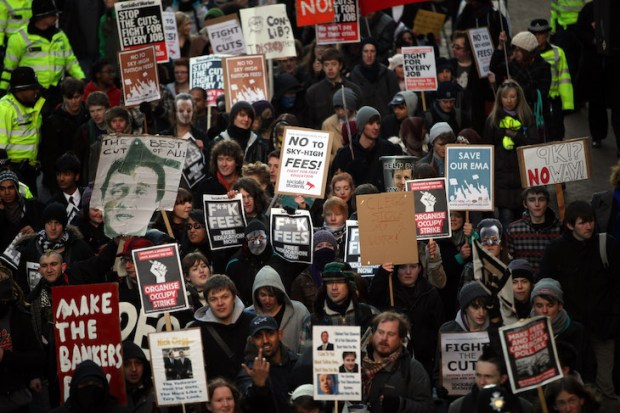Coming back to the office after a holiday is never a pleasant experience. There’s the clogged inbox, the reminders that you have left undone those things which you ought to have done, and the realisation that you won’t get another break for months. But even by these standards, Ed Miliband has had a difficult return to work. He’s been met by a cacophony of demands, many of them contradictory.
Miliband does have problems. He lacks the sort of policies that would show the voters what he’s about, his shadow cabinet are underperforming, and the Tories seem to have moved into disciplined election-fighting mode. But he can take comfort from a problem he doesn’t have: there is no left-wing alternative to Labour, no party cannibalising his vote. In a close election, this could be crucial — especially given that Ukip will take a bite out of the Tory vote.
This absence of a Ukip of the left means that Miliband can commit to matching the coalition’s spending plans without having to worry about voters going elsewhere. The gap in the market in British politics now is for a full-on anti-austerity party. No one looks like filling it. The Greens are shy of the limelight, Respect remains a sectional interest and efforts at left unity are at the People’s Front of Judea/Judean People’s Front stage.
In some ways, Miliband is the author of his own good fortune. If his brother had won the leadership, an alternative leftist party might well have emerged. Ed has, to David’s audible annoyance, apologised for Labour’s support for the Iraq war. Given the divisions that Iraq created on the left, this was the pragmatic thing to do. He has also avoided the third-way habit of deliberately picking fights with those to the left of him.
Even so, Miliband has ended up trying to weaken the union barons’ grip on Labour. After Unite’s crude efforts to flood parliamentary selections, he had to do something. He chose to attempt radical reform rather than tinkering. By choosing that path, he has risked giving life to a new left party. Any group that had access to the unions’ organisational and financial muscle — they provide around three-quarters of Labour’s donations — would be formidable.
As recently as the 2005 election, there was a sizable party trying to rival Labour on the left. The Liberal Democrats under Charles Kennedy made a concerted effort to outflank Labour. They were the anti-war party who wanted a 50p top tax rate and a local income tax. But the Liberal Democrats are a very different proposition now. At the next election, they’ll be a party that’s been in government with the Tories for five years, presiding over welfare cuts and a reduction in the top rate of tax. As a result, at least a fifth of those who voted for the Liberal Democrats last time appear to have shifted permanently into the Labour column.
Labour’s base, Miliband’s number-crunchers calculate, now amounts to more than 30 per cent of the electorate; perhaps even as much as 34 per cent. And in 2005, Blair won a comfortable majority with 35 per cent of the vote.
If Miliband wants to see what problems a new left party could cause him, he just needs to look at the agonies Ukip is causing the Tories. While Ukip doesn’t draw its support exclusively from former Tory supporters, Tory MPs in marginal seats estimate that two-thirds of Ukip voters used to be theirs. If they’re right, a Ukip vote share in the high single digits could be enough to stop a Conservative victory in 2015. So the Tories have to keep a lid on Ukip support at the same time as going after more centrist voters.
The Tory effort to deal with Ukip seems to come in three parts. The first is to address as many of the obvious causes of its support as possible. Hence the current Tory emphasis on welfare reform and immigration, as well as Cameron doing what he can to show that he really is committed to a post-2015 EU referendum. Economic recovery, they hope, should also help convince those who’ve switched to Ukip that the government is competent after all.
The second part of the strategy is to stress that if you vote Ukip, you’ll get Labour. According to polling by Lord Ashcroft last year, those who’d consider voting Ukip prefer Cameron to Miliband as Prime Minister by two to one. These same people say that the risk of letting Labour into power is the thing most likely to stop them voting for Ukip.
The third and perhaps most important part of the plan is to deny Ukip publicity. When the party is in the news, its ratings rise. If Ukip is a large part of the general election story, then it is hard to see how its vote won’t vastly exceed the 3 per cent it polled last time. One of those involved in Labour’s election planning argues that how much coverage Ukip gets will be absolutely crucial to the election result. This makes it imperative for the Tories that Nigel Farage is not in the TV debates.
At the moment, the Tories look far more prepared for the general election campaign than Labour. They have their messages and their key campaign personnel in place, while Labour has neither. Now it’s matching the coalition’s current spending plans, it doesn’t even have a strong intellectual critique of the coalition.
Miliband, though, doesn’t have to achieve 1997-style dominance to become Prime Minister. He has huge structural -advantages: Labour can win a majority on a far lower share of the vote than the Tories because of favourable constituency boundaries, and it has no competition for votes on the left. Whatever troubles Miliband is having, Labour will be competitive in 2015.
Got something to add? Join the discussion and comment below.
Get 10 issues for just $10
Subscribe to The Spectator Australia today for the next 10 magazine issues, plus full online access, for just $10.















Comments
Don't miss out
Join the conversation with other Spectator Australia readers. Subscribe to leave a comment.
SUBSCRIBEAlready a subscriber? Log in